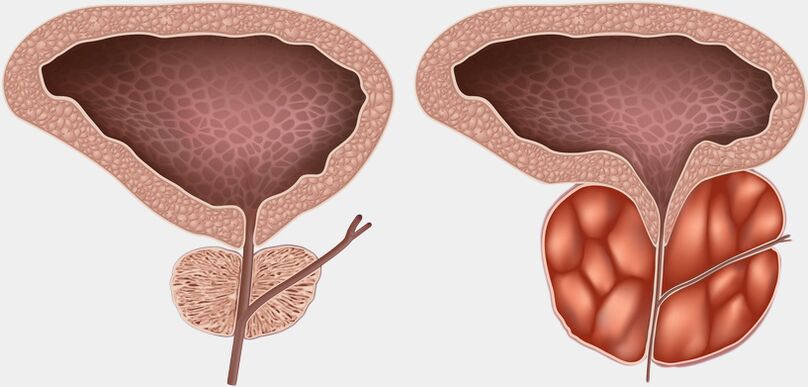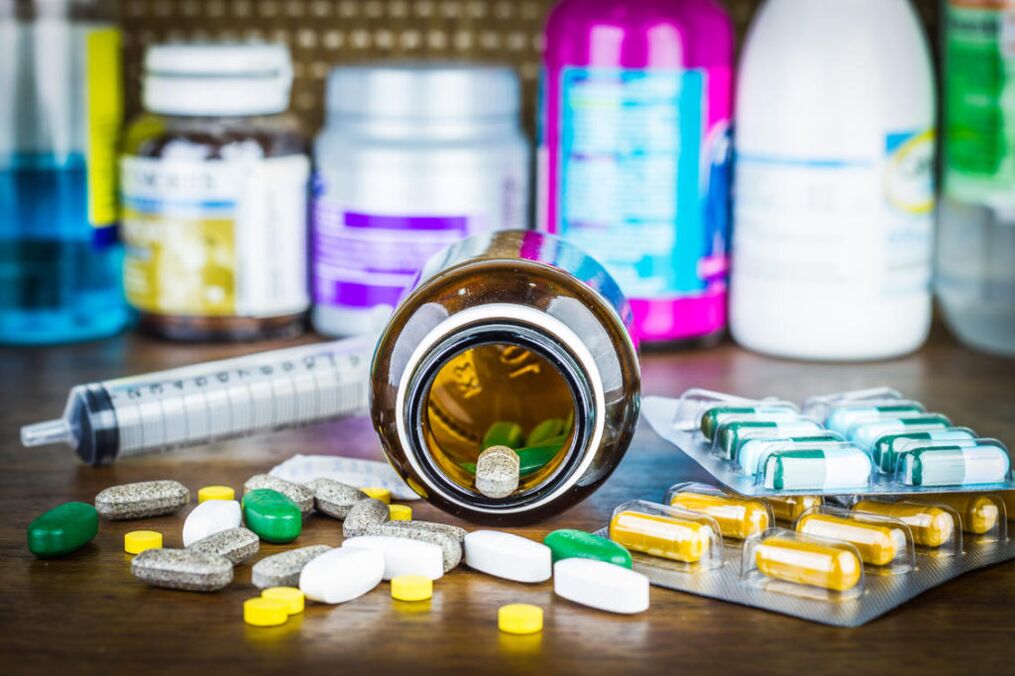In the treatment of prostatitis, drug therapy is most often prescribed. During its passage, the patient must take drugs of different categories. Some are designed to eliminate symptoms that cause discomfort, while others purposely act directly on the affected gland, eliminating the most important thing - the root cause. At the same time, the drugs differ in the strength of their influence, as some are designed to eliminate acute, while others are against chronic. Let's look at the most popular drugs used in the treatment of prostate inflammation.

Types of drugs for prostatitis
All drugs prescribed by the attending physician can be divided into several categories according to the method of application:
- Tablets and capsules- taken orally, it is moderately absorbed by the body, in the case of capsules, absorption occurs much faster, since all the components reach their destination shortly after the gelatin shell dissolves.
- Injections- these can be liquid and powder preparations, which are further diluted in a working fluid, usually an anesthetic, administered intramuscularly or intravenously and the effect can be visible after a few minutes.
- Rectal suppositories (candles)- have anti-inflammatory, antibacterial and analgesic effects, they are injected into the patient's rectum when he is on his side and in this position he must spend about half an hour so that the medicine is completely digested and absorbed.
- instillations- a group of drugs that has the maximum positive effect only in case of direct entry into the area of the affected prostate gland, the method is used in the hospital, since the introduction is made through the urethra.
- Microclysters- as a rule, this includes non-drug remedies, for example, herbal decoctions, they are not able to replace drug therapy, but they can be a good way to eliminate pain or prevent it.
It is worth noting that some types of medicine can be sold in several forms at once, for example, tablets and suppositories, so the attending physician must show this characteristic without fail.

The most popular drugs for the treatment of prostatitis
Treatment of prostatitis with drugs is a rather complicated procedure that requires the doctor to choose the right drugs that will not only relieve pain and eliminate other symptoms with manifestations, but also help eliminate the root cause of the disease. The disease itself can also have a different origin, appear in acute or chronic forms and give the patient the most diverse range of discomforts, limiting it both to natural issues and leading to complete infertility.
Classic tablets, intramuscular injections and rectal suppositories can be used in the treatment of prostatitis. The choice of the drug directly depends on the need for the urgency of delivering its components to the affected organ.
Do not self-medicate! The main drug must be prescribed exclusively by the attending physician.
Additional funds
Treatment of prostatitis is not limited to a drug. Specialists can also use other types of medications of different categories.
Fluoroquinolones
Fluoroquinolones are antibacterial drugs used in the treatment of prostatitis of tuberculous origin. These funds are used in a complex, and the patient can be prescribed a course consisting of four or more drugs at once.
Cephalosporins
Cephalosporins are antimicrobials designed to fight specific types of bacteria.
Such drugs can have a wide and directed spectrum of action, and the need for the use of a particular agent directly depends on the form of the disease and the cause of its occurrence.
Macrolides
Macrolides in the treatment of prostatitis are rarely used, as they aim to fight certain types of bacteria, such as mycoplasma and chlamydia. By the way, a disease such as chlamydia is often accompanied by prostatitis, so doctors prescribe several tests immediately to identify problems with the prostate gland in the early stages.
In acute manifestations of prostatitis, the attending physician may prescribe several drugs of different categories at once. This approach allows you to effectively deal with both the symptoms and the disease itself.
Analgesics
The vast majority of analgesics are prescribed in the presence of acute pain syndrome, which is an integral companion of chronic, but more often acute forms of prostatitis. The use of drugs belonging to this group, outside the framework of drug therapy aimed at eliminating the disease, is strictly not recommended, as the body quickly gets used to them and to achieve an analgesic effect, an increase in the dose will be required, which maynegatively affect the liver and kidneys. The course of analgesics is prescribed on an individual basis.
Alpha blockers and muscle relaxants
The main task of these groups of drugs is to relieve tension from the spasmodic muscles of the bladder, urethral canal and also reduce pressure in the pelvic area. These tools help to get rid of the feeling of discomfort and normalize urination processes.
Immunomodulators
Such drugs basically contain natural ingredients, in the case of prostatitis - extracts based on cattle prostate tissue. Regardless of the drug, they all have a common principle of action, allowing:
- slow down the course of inflammatory processes;
- increases the tone of smooth muscles and bladder walls;
- minimize the possibility of blood clots;
- improvement of blood circulation in the prostate area;
- reduce the size of the prostate.
Immunomodulators can be used in a variety of diseases, including chronic prostatitis, acute non-infectious prostatitis, prostate adenoma.
Moreover, such funds are actively used for preventive purposes, which helps to avoid the onset of the disease or its recurrence.
Vitamins and biological supplements
Remedies that fall into these categories can reduce inflammation, improve fluid flow, and relieve congestion. The need for such drugs is also due to insufficient intake of useful nutrients in the body, especially during the course of antibiotics.
Prostatitis is a rather complex disease, the treatment of which should be treated only by a real specialist. Self-selection of drugs is not strictly recommended, since with this approach there is a high percentage of the likelihood of complications in the form of infertility, impotence and even increases the risk of developing cancer. Using prostatitis remedies without consulting a doctor can lead to the fact that it will be impossible to get rid of the disease without surgery. In addition, self-medication is complicated by the impossibility of making an accurate diagnosis, as this requires appropriate equipment and knowledge.
It is also necessary to remember that most of the drugs used in the treatment of prostatitis are quite toxic, and some types are simply incompatible. If you feel pain in the pelvic area during urination, defecation or ejaculation, go to the toilet often and cannot empty the bladder normally, it is not worth the risk - consult a doctor. Thus, you will not only prevent the unfavorable course of the disease, but you can avoid the development of its chronic form, which you will have to live with for the rest of your life. In addition, your sexual function will not be damaged and with timely treatment you will be able to have completely normal and healthy offspring.





























